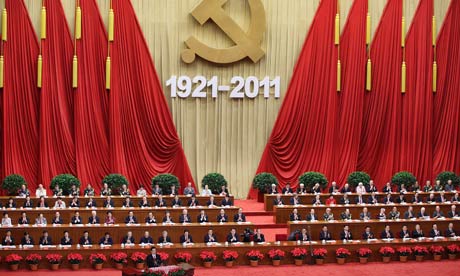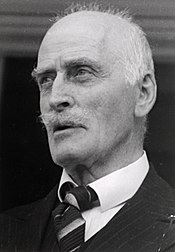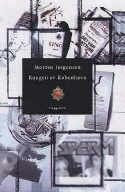Many Western commentators seem reluctant to leave post-colonial mode when trying to grasp the new China. There is a predominant tendency in the West to assume that China is shaping her new identity in contrast to the West, that China is somehow defining her global role as some kind of counterpart to the Western World.
Some years ago, I saw numerous accounts in Western media, detailing the expansion in China of popular Western brands like McDonald's, Starbucks and Coca-Cola. The sub-text was often banally gleeful: "Look, the Chinese are becoming civilized!" But in Beijing anno 2011, I saw no queues outside KFC or Pizza Hut. Sure, there are nuggets peddled and burgers served, but most Chinese enjoy their communal meal at their local, often packed, traditional Chinese restaurant, like they always have. Besides, most of them prefer a slice of the good old cong ju bing (green onion pancake), not pizza*.
We were several foreigners staying at the 3-star hotel in the district of Andingmen; Australians, Americans, Germans, Japanese, some speaking languages I could not identify there and then. All sorts of people, really. A result of the hotel advertising outside China on a regular basis for customers. But still, the hotel had made very little effort to cater for its foreign guests.
Ok, so the bathroom was European standard, there was almost fluent English spoken by the office management during office hours, and the buffet dishes were labeled in English, but the menu was all-Chinese. No croissants, no corn flakes, no cheese, nothing that even resembled sucking up to European tastes. The apple juice was heated, and if you haven't tried red bean curd (tofu), you should maybe consider limiting yourself to a very, very small piece** before you divulge. Fortunately, there was coffee.
THE LACK OF JAVA
In my hotel room, there was a boiler and bags of tea. But no instant coffee. There are many foreigners in Beijing. Coffee to foreigners should be good business, right?
It's not like it is difficult to find yourself a caffe latte in Beijing. But mostly you'll find it in hipster coffee bars and European-inspired lounges. Take a stroll to the Embassy District, the "West End" of Beijing, or hip quarters like "Guitarshop Street" a.k.a. Gulou (Bell Tower) East Street, where also the rock club Mao Live House is located, and you will easily find your way to the next coffee bar. But the further you get from the city center and the deeper into Beijing you dive, the harder it is to get yourself a simple cup of Java.
For a coffee addict like myself, the absence of coffee came as a total surprise. It also challenged stubborn Eurocentric thought patterns, that I - somewhat embarrassed - found myself stuck in. I had expected coffee to be a token of China romancing, even courting the West, but no. What was equally surprising, was the fact that nobody excused themselves for not serving coffee. No embarrased blushing, no courtesy regrets, no post-rural loss of provincial face. On the contrary, the staff in almost every restaurant I visited, just laughed: “Coffee?? Ha-ha, no, we don’t serve coffee."
 The aristocratic 5-star Hotel Beijing resides a block northeast of the Tienanmen, strategically located in the very geographical nexus of Chinese political power, on the corner of Dongchang'an Avenue and Wangfujing Steet, Beijing's partly pedestrian main street. A hotel with a scent of History, in which ballrooms Communist legends like Mao Zedong held receptions and
entertained foreign guests. So at the Beijing Hotel, surely, one would expect to be served
coffee ...? None of the four waitresses in the 5-star lunch restaurant spoke any English*** at all, and there was no coffee served. Body language tell-tale; their reaction was typical, no need for a dictionary:
The aristocratic 5-star Hotel Beijing resides a block northeast of the Tienanmen, strategically located in the very geographical nexus of Chinese political power, on the corner of Dongchang'an Avenue and Wangfujing Steet, Beijing's partly pedestrian main street. A hotel with a scent of History, in which ballrooms Communist legends like Mao Zedong held receptions and
entertained foreign guests. So at the Beijing Hotel, surely, one would expect to be served
coffee ...? None of the four waitresses in the 5-star lunch restaurant spoke any English*** at all, and there was no coffee served. Body language tell-tale; their reaction was typical, no need for a dictionary: “Ha-ha, no, we don’t serve coffee."
Ok. (Dictionary intermission.) Tea, then?
"Absolutely, I'll fetch our hand-painted tea menu, handcrafted in sandalwood."
When I feasted on rack of lamb coriander at a very fine 5-star Chinese restaurant, the staff started giggling when I, after an excellent meal, asked for a coffee. No, no kaffei. What a far-fetched thought, haha!
FAKE TEA AND DA GONG PAO
 They did, however, serve Da Gong Pao tea, a brew that would have cost 25 Euros a pot back home. The restaurant was in every way well stocked, but not even at this level of Beijing luxury, they could be bothered to serve coffee. However, they had Coca-Cola, and were particular about asking me if I wanted a can of Coke. Or a Cuban sigar, maybe?
They did, however, serve Da Gong Pao tea, a brew that would have cost 25 Euros a pot back home. The restaurant was in every way well stocked, but not even at this level of Beijing luxury, they could be bothered to serve coffee. However, they had Coca-Cola, and were particular about asking me if I wanted a can of Coke. Or a Cuban sigar, maybe?“Ha-ha, no, we don’t serve coffee. In China, we drink tea.”
I was later told that counterfeit tea is big business in China. You simply claim that a tea costing 1 Euro a kilo in fact is a tea priced at 60 Euros a kilo. That's probably more profitable than selling marihuana to the hipsters of Beijing.
Most of the tourists I saw on the Tienanmen and in the Forbidden City, were Chinese. The Beijing hotels and restaurants have a potential of 1,3 billion customers inside their own borders. Why bother with coffee, if you can sell even more tea to the sightseeing-weary traveler from Guandong or Shanghai?
FASHION STATEMENTS
Of course, fashion is inspired by Western pop culture, so is music. Style is a rather new and fresh concept in China, but Beijing style is not a Western copy. Style is shaped by adaptation; the Chinese way. I saw just as much Japanese influence as Western. If anything, Beijing style is a silent response, not to the West, but to China's own past, to the "excesses" of the Cultural Revolution in the 60ties, to the days of dress-as-one; green, black, grey, blue: "Thanks, but no thanks. We want to dress exactly as we please."
The mode a la Beijing, which includes black metal T-shirts Made in China as well as Fruit Of The Loom, fake or real, does not subliminally express, "We want to be Westerners", but rather, "We want to be modern. We are peasants no more", an issue I shall return to in a later post. In Beijing, style is pride, independent of income level.
So, it goes without saying, the Chinese have started designing their own clothes, probably spurred on by their very successful textile export industry, and among the youngsters I met, it seemed to me that Made in China was at least as popular, if not even more popular than Western brands.
Besides, only hipsters care about labels in Beijing, just like your local iPad- and Ray-Ban-toting hero with the green Adidas does back home, and the sound of modern China is not Lady Gaga or Coldplay, but Chinese pop, the kind of easy-listening pop music you might hear in a Chinese restaurant in the West. And when listening to it, the Beijinger does not carry an iPad or an iPhone, he spouts a Lenovo LePad or LePhone, the IBM-developed tablet and smart phone resp., with Chinese character sets and keys. At 530 dollars/380 Euro, they are selling by the thousands, even millions in China. 特别优惠。
ACCESSING FACEBOOK IN CHINA
A myth is prevailing in the West. It says that if only the Chinese knew, like, you know, really, really knew, how great life is in the West (as compared to life in China), yes, absolutely, if only the Chinese could read and understand English***, and if only they had access to Facebook and Twitter and if only they could read our free-speech newspapers and if only they could watch our uncensored TV, they would surely want to live and be exactly like us. Why, even take to the streets, demanding that China should choose the Way of the West?
If the Beijinger is concerned with censorship, she will be concerned with the censorship of something Chinese, not the Communist authorities blocking out Facebook, Twitter or YouTube. Most young, urban Beijingers are fully aware of the existence of VPNs and proxies. The Chinese could be on Facebook if they wanted to, it is not all that difficult. I, for one, had no problems with by-passing the censorship, and everybody I spoke to, took that for granted, me being a foreigner in Beijing and all. But, if you are Chinese, why bother, when you have Renren, QZone (both Facebook-ish) Sina Weibo (China's answer to Twitter), Baidu (search engine) and Youku (video)? All your friends are there, too, of course.
WHO WANTS YESTERDAY'S PAPER?
Everywhere I went in China, and the more I walked, I came to the conclusion that the West is completely overestimating its own influence and impact on China. I cannot speak for other cities than Beijing, and hardly even that, aware as I am that 10 days is too short a time for understanding every aspect of any major city, not to mention a city of plus 20 million people. But to me it seems that most of Western mainstream analysis of China is flawed, even biased, as the commentators wrongly assume that Europe and the US are all that important to the average Chinese, and in that sense, to China as such. We're not.
On the contrary, based on my Beijing visit, I tend to think that China is not really all that concerned with the West. At least not as much as the West would like to think. It takes a strong back to admit you are being overlooked. The United States, Europe ... It's very far away, isn't it? Plus, the population of Western Europe and the US is half the size of China’s, right? And the Western crisis-stricken economies are crumbling, while China is prospering, isn't that so?
Its a simple as this: The average Chinese is fully aware that China's era has come. The Communist authorities make sure they keep the Beijingers updated on Chinese acquisitions of American stocks and bonds, as well as with China's latest triumphs in international sports. Any Beijinger can feel the - quite literary - daily progress, see the thriving economy expand, sense the general extreme growth of the People's Republic of China, eradicating illiteracy and poverty by the minute, fulfilling dreams.
Of course, some "Western sectors" are extremely important to China***, e.g. finance and technology, but that is not a concern for the average Beijinger. It is the domain of specialists, of experts. The Beijinger of today has more than enough with China. His and her China. Inspired for centuries by Confucius and Buddha, not by Aristotle or Hegel.
The urban Chinese buys her grandmother a modern apartment with running water or an Ibanez ARZ guitar for himself, and they are all quite proud of the turn of the tides, proud of themselves, proud of China, proud of "the Chinese Miracle". So why bother with yesterday's heroes?
* I shall return to the question of foreign languages in a later post.
*** In spite of the myth that claims pizza was invented in China.

































